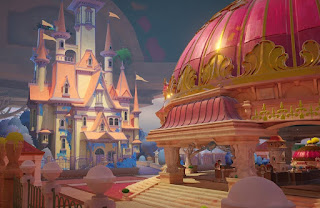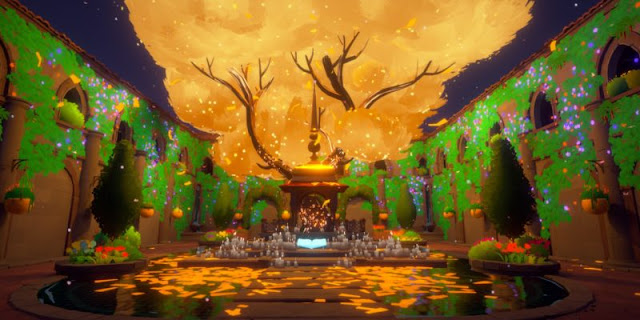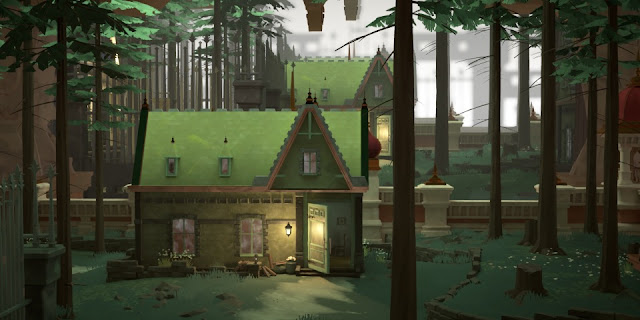Maquette is a game that has been inspired by a lot of things. The first person puzzler (it’s clear the developers have spent a lot of time inside The Witness and Portal) is certainly one. Walking simulators are another, in the way that the game shares its story in perfect choreographical lock-step with movement through the world, and that it shares player interaction without a single physical person showing up. However, for me, it’s the poetic way that it shares its plot and vignettes that could have been Maquette’s strongest feature. If you were to run through the game without ever getting “stuck,” there’s a beautiful, elegant rhythm to this thing. It might be closer to a teenager-in-love poem than Edgar Allan Poe or Shakespeare in terms of its quality, but it’s a lovely little narrative experience. Unfortunately, it does let the puzzles get in the way of that.
Maquette’s puzzles are, in isolation, strong. The game works with perspective, with all the puzzles being recursive in nature, and it’s something that’s never been done to such a sustained degree in a puzzle game before (at least, as far as I can recall). This is complex to visualise, but it works with surprising elegance in action. In simple terms: in each area, you explore there’s a small diorama in the middle, and what it’s in the middle of is a larger, exact replica of the diorama. What you do to the diorama is replicated in the “big world,” so, to give you a really simple example of this in action – say you get a key in the big world. You could use that key to create a “bridge” in the diorama, which would cause a massive key in the big world to give you a bridge to walk across there as well. By manipulating small and big, you’ll be able to navigate through locked doors, gaping chasms and blocks that would otherwise be impassable.
These puzzles are pretty cleverly designed and will cause you to pause and think about perspective, scale, and geography. Because we don’t really see these specific kinds of recursive puzzles in games, it comes across as a fresh look at a tired genre, and as an added bonus, nothing about Maquette is insulting to the intelligence. Its puzzles are eminently solvable, and not cruel about it, but it also refuses to hold your hand through the experience. You’re getting through on your own wits, and nothing else.
Maquette’s problem is that it also wants to be a narrative experience. The game tells the story of two people who meet, fall in love, have a relationship, go through all the trials and tribulations of such and – while avoiding spoilers here – the conclusion to the romance. It’s told – and performed – nicely, and while you’re not going to walk away from Maquette with a profound new insight into the human condition, the narrative does know how to tug at the heartstrings. This is backed up with a gorgeous, evocative soundtrack and an aesthetic that emphasises beauty and a poetic ambience.
That narrative, soundtrack, and aesthetic is so tenuously linked to the actual gameplay, though. There’s a vague theme in there of the recursive puzzles being a reflection on how, in a relationship, the smallest details have a habit of ballooning out into insurmountable obstacles, but it’s very, very tenuous. When you think about how explicitly the puzzles and narrative interacted in Portal or The Witness, the disconnect in experiences in Maquette is difficult to resolve internally. This is especially true when, as I alluded to earlier, the narrative has a particular rhythm that it’s aiming for. Between puzzle bits, there’s some soaring music that is timed to exactly the length of time that it takes to progress to the next area, while reading the snippets of narrative that link the two. So, what happens when a puzzle stumps you for a while?
Exactly. Maquette allows a good chunk of its potency as a narrative experience be undermined by the quality of its puzzles. I don’t think the developers have done a poor job with either. I just don’t think the two distinct elements at play in this game come together in a particularly effective, complementary manner. As a consequence, I found myself disproportionately frustrated with puzzles – puzzles that I otherwise admired for their ingenuity and originality – because they were disrupting the rhythm of a narrative I was invested in.
Maquette – and the development team – deserve better. There’s some real talent evident in the unique, interesting, contemplative and rewarding puzzle design here, and that kind of quality occurs less and less frequently in this vapid and action-obsessed industry. The development team also know how to write interesting and emotionally engaging narratives – we don’t see stories about love told with this kind of sincerity anywhere near often enough. Unfortunately, the one and only problem that the game has is also the thing that almost breaks it; the two elements that the entire experience relies on are at near-complete odds with one another.










